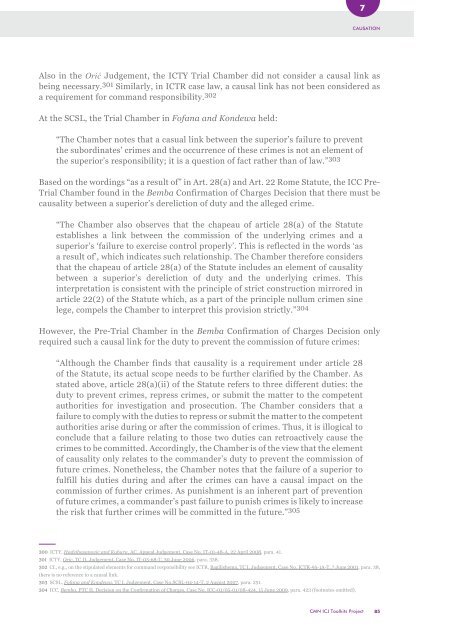Command Responsibility
CMN_ICL_Guidelines_Command_Responsibility_En
CMN_ICL_Guidelines_Command_Responsibility_En
Create successful ePaper yourself
Turn your PDF publications into a flip-book with our unique Google optimized e-Paper software.
7<br />
CAUSATION<br />
Also in the Orić Judgement, the ICTY Trial Chamber did not consider a causal link as<br />
being necessary. 301 Similarly, in ICTR case law, a causal link has not been considered as<br />
a requirement for command responsibility. 302<br />
At the SCSL, the Trial Chamber in Fofana and Kondewa held:<br />
“The Chamber notes that a casual link between the superior’s failure to prevent<br />
the subordinates’ crimes and the occurrence of these crimes is not an element of<br />
the superior’s responsibility; it is a question of fact rather than of law.” 303<br />
Based on the wordings “as a result of” in Art. 28(a) and Art. 22 Rome Statute, the ICC Pre-<br />
Trial Chamber found in the Bemba Confirmation of Charges Decision that there must be<br />
causality between a superior’s dereliction of duty and the alleged crime.<br />
“The Chamber also observes that the chapeau of article 28(a) of the Statute<br />
establishes a link between the commission of the underlying crimes and a<br />
superior’s ‘failure to exercise control properly’. This is reflected in the words ‘as<br />
a result of’, which indicates such relationship. The Chamber therefore considers<br />
that the chapeau of article 28(a) of the Statute includes an element of causality<br />
between a superior’s dereliction of duty and the underlying crimes. This<br />
interpretation is consistent with the principle of strict construction mirrored in<br />
article 22(2) of the Statute which, as a part of the principle nullum crimen sine<br />
lege, compels the Chamber to interpret this provision strictly.” 304<br />
However, the Pre-Trial Chamber in the Bemba Confirmation of Charges Decision only<br />
required such a causal link for the duty to prevent the commission of future crimes:<br />
“Although the Chamber finds that causality is a requirement under article 28<br />
of the Statute, its actual scope needs to be further clarified by the Chamber. As<br />
stated above, article 28(a)(ii) of the Statute refers to three different duties: the<br />
duty to prevent crimes, repress crimes, or submit the matter to the competent<br />
authorities for investigation and prosecution. The Chamber considers that a<br />
failure to comply with the duties to repress or submit the matter to the competent<br />
authorities arise during or after the commission of crimes. Thus, it is illogical to<br />
conclude that a failure relating to those two duties can retroactively cause the<br />
crimes to be committed. Accordingly, the Chamber is of the view that the element<br />
of causality only relates to the commander’s duty to prevent the commission of<br />
future crimes. Nonetheless, the Chamber notes that the failure of a superior to<br />
fulfill his duties during and after the crimes can have a causal impact on the<br />
commission of further crimes. As punishment is an inherent part of prevention<br />
of future crimes, a commander’s past failure to punish crimes is likely to increase<br />
the risk that further crimes will be committed in the future.” 305<br />
300 ICTY, Hadzihasanovic and Kubura, AC, Appeal Judgement, Case No. IT-01-48-A, 22 April 2008, para. 41.<br />
301 ICTY, Oric, TC II, Judgement, Case No. IT-03-68-T, 30 June 2006, para. 338.<br />
302 Cf., e.g., on the stipulated elements for command responsibility see ICTR, Bagilishema, TC I, Judgement, Case No. ICTR-95-1A-T, 7 June 2001, para. 38,<br />
there is no reference to a causal link.<br />
303 SCSL, Fofana and Kondewa, TC I, Judgement, Case No.SCSL-04-14-T, 2 August 2007, para. 251.<br />
304 ICC, Bemba, PTC II, Decision on the Confirmation of Charges, Case No. ICC-01/05-01/08-424, 15 June 2009, para. 423 (footnotes omitted).<br />
CMN ICJ Toolkits Project<br />
85


